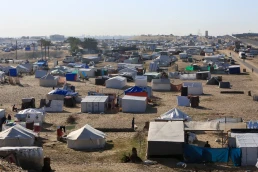By Julia Conley, Common Dreams
The climate crisis and other environmental calamities are quickly becoming the greatest threat to human rights across the globe, the United Nations’ top rights expert said Monday.
At the 48th session of the U.N. Human Rights Council, High Commissioner Michelle Bachelet warned that
“the triple planetary crises of climate change, pollution, and nature loss is directly and severely impacting a broad range of rights, including the rights to adequate food, water, education, housing, health, development, and even life itself.”
“As these environmental threats intensify, they will constitute the single greatest challenge to human rights in our era,” she said.
Bachelet’s comments came weeks after the U.N. identified Madagascar’s current hunger crisis as quickly becoming the world’s first famine driven almost entirely by the climate crisis, as the heating of the planet has caused the country’s years-long drought.
“Extreme and murderous climate events” have been recorded in regions across the world, Bachelet said, pointing to record-breaking rainfall and flash flooding in countries including Germany, Turkey, and China; an Arctic heat wave that scientists linked to a cold snap in North America that led to a deadly deep freeze and power outage in Texas; and “interminable drought” across much of the world that has displaced millions.
Such crises are intensifying conflicts in places including northern Africa’s Sahel region, where desertification and long droughts—often followed by dangerous flash flooding—have run up against “weak governance of natural resources; long-standing patterns of poverty and inequalities; inadequate access to basic services; and high rates of youth unemployment and discrimination against minorities, women and girls.”
“These trends compel people into displacement, aggravate conflicts and political instability, and fuel recruitment by violent extremist groups,” said Bachelet. “In such a situation it should be clear that there can be no purely military solution to the conflicts in the region.”
Environmental threats have led to the displacement of four million people across the Sahel region, according to the U.N., with the Office for the Coordination of Humanitarian Affairs (OCHA) saying the area is facing “an exceptional crisis.”
The commissioner also identified countries including China, India, and Bangladesh as facing widespread “disaster displacement,” with 20 million people in Bangladesh expected to be forced from their homes by 2050 as 17% of the country becomes “submerged by rising sea levels.”
“Forecasts of this gravity and impact—including on displacement—cannot be ignored by any policymaker, anywhere,” Bachelet said. “They will have cascading economic, social, cultural, and political effects that will impact every society in the world.”
In addition to the long-term effects of drought and the heating of the planet driven by continued fossil fuel extraction, the commissioner noted that air pollution—”fueled by the same patterns of unsustainable consumption and production as climate change”—is responsible for an estimated one in six of all premature deaths around the world.
The 33 countries found to be at “extremely high risk” for hazards including air pollution, according to a report issued by UNICEF last month, emit only 9% of global carbon emissions and are home to 2.2 billion children—meaning those countries least responsible for the climate crisis are most at risk for the human rights threats it is causing.
As Bachelet made her statement on the climate emergency’s effect on human rights, Amnesty International joined more than 1,000 civil society groups in calling on the Human Rights Council to “recognize a safe, clean, healthy, and sustainable environment as a universal human right.”
“Governments’ failure to act on climate change in the face of overwhelming scientific evidence may well be the biggest intergenerational human rights violation in history,” said Agnès Callamard, secretary general of Amnesty International. “As the primary global human rights body, the HRC must use all the tools at its disposal to counter the crisis. We call on all states to support recognition of the right to a healthy environment, at the U.N. and at national level. Those who do not will be on the wrong side of history and standing against the common future of humanity.”
Governments’ failure to act on the climate crisis in the face of overwhelming scientific evidence may well be the biggest inter-generational human rights violation in history. The @UN (and the US) must recognize the right to a healthy environment. @USAmbUN https://t.co/pPaWvtIz7r
— Amnesty International USA (@amnestyusa) September 13, 2021
Bachelet looked ahead to the 2021 U.N. Climate Change Conference (COP 26), taking place in Glasgow, Scotland in November, where she said she will be “strongly advocating more ambitious, rights-based and inclusive climate action.”
The commissioner’s statement amplified a call from more than 100 nations in the Global South earlier this year in which government officials and experts demanded $100 billion in climate financing and net-zero emissions targets “with end-dates well before 2050” in order to “take responsibility” for rich nations’ disproportionate role in causing the planetary emergency.
“States’ human rights obligations require them to cooperate toward the progressive realization of human rights globally, and this clearly should include adequate financing by those who can best afford it of climate change mitigation, adaptation, and loss and damage,” said Bachelet.
Recent Posts
Why Are Democratic Lawmakers Still Meeting With Netanyahu?
July 12, 2025
Take Action Now Pictures show Democrats like Chuck Schumer standing next to Netanyahu, smiling.By Sharon Zhang, Truthout A bipartisan group of…
Stop Israel’s Dystopian “Humanitarian City” Plan—Before It’s Too Late
July 11, 2025
Take Action Now For the past 20 months, the world has watched—and largely enabled—a genocidal campaign in Gaza. Over 55,000 Palestinians have been…
The “Liberal” International Order Is Criminalizing Palestine Protests
July 11, 2025
Take Action Now As Western governments repress Palestine solidarity and enable Israel’s impunity, the “liberal international order” is no longer…
Politicians Are Betraying Gen Z On Climate
July 10, 2025
Take Action Now While Gen-Zers thrift, knit, crochet, and find other ways to reduce our footprints, Trump and the GOP are greenlighting more climate…




